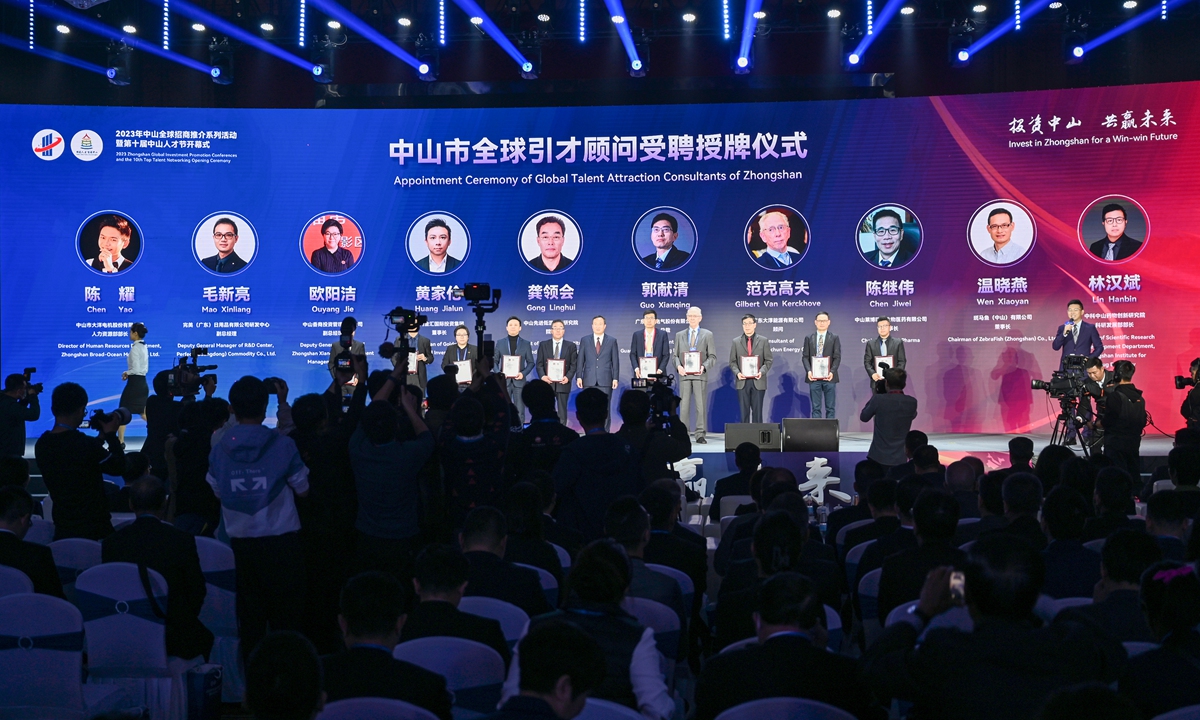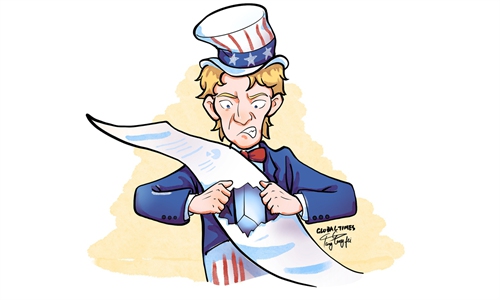
An appointment ceremony of global talent attraction consultants of Zhongshan, South China's Guangdong Province, was held on March 30, 2023. Photo: VCG
With China's reopening after COVID-19, we are now seeing a greater opportunity for more people to go to China. Will this position China as the world's leading cosmopolitan innovation center? I suppose only time will tell. But the data, of course, is promising.Recently, Bert Hofman, director of the East Asia Institute and professor at the Lee Kuan Yew School of Public Policy in Singapore published an interesting tweet with data from the Organization for Economic Cooperation and Development (OECD) Science, Technology and Innovation Outlook 2023 showing that, in the year 2021, China had a net inflow of scientist while the US had a net outflow.
He says, "The international flow of talent is a good predictor of future capability. E.g. it explains why the U.S. still dominates AI even though China's output of papers is catching up," which means that China is building immense future capability by attracting scientists from all over the world.
"China saw the largest increase in money and scientists in the past decade. One can debate the quality, but it would be hard to argue that quality went down. So research capabilities have vastly increased," he explained further.
The US had long been a beneficiary of foreign talent from all over the world, in particular, from China, India and the former Soviet Union. These workers sought what they saw as limitless earning potential in the melting pot that is supposedly America.
In fact, given its extensive immigrant makeup - the fact that nearly everyone who inhabits North America is not a native of that land - it has long been said that America is a microcosm of the world. It is, they say, a miniature version of the world and cities like New York City are perfect illustrations of this cosmopolitan America.
However, many people, including myself, have begun to cast serious doubt over the US as a cosmopolitan hub for innovative talent over the past several years. It's not only because an open racist Donald Trump served as president from 2017 to 2021, but because Washington is adopting a protectionist trade policy that is pushing out foreign competition. And its domestic situation is too unbearable for most sane people in the world.
Foreigners have to worry about many things. They have to live with the constant fear that they might get gunned down at a large public venue, which is particularly true for minorities and immigrants. In the case of Asian and particularly Chinese people, they could face immense and growing terroristic threats as well as official probes from the Department of Justice like the so-called China Initiative witch hunt.
And moreover, immigrants are reduced to virtual slaves to their employers in the US. One wrong move to their employer could result in their visas - thus their entire lives - being revoked. That's because most foreigners in high-tech sectors have employer-sponsored visas that mean they're tethered to one employer, often making them targets for labor violations and wage theft without any serious legal recourse.
To put it plainly, the realities of being a foreign scientist, expert or another high-skilled worker in the US are no longer worth it. The juice is not worth the squeeze. This is leading to a situation where Washington's future technological advantage could be compromised, given the fact that foreign talent is so essential.
Recent years have seen enrollment at US universities and colleges dip immensely, with only a slight rebound this spring semester in 2023. Commenting on poor figures from the fall of 2021, National Security Advisor Jake Sullivan quoted First Lady Dr. Jill Biden as actually saying that "any country that out-educates the United States will outcompete the United States, and that is a fundamental national security issue."
Of course, he was talking about China. And referring back to the data presented at the beginning of this column, it is clear why China is attracting global talent. It has to do with relatively high salaries compared to the cost of living, of course, but also mostly, I would bet, with the fact that all of these negative factors I listed about the US do not exist in China.
China is not a wasteland of destitution that lacks opportunity; China is growing at break-neck speed, and with it too is the standard of living of the population. China does not have gun violence endemic, wanton crime, vitriolic poverty or a surplus of white supremacist terrorism.
On the contrary, China is an extraordinarily safe country that has strived for the total eradication of poverty in all forms. While relatively traditional compared to the West, the Chinese people are, on balance, respectful and curious about other cultures.
The author is a Prague-based American journalist, columnist and political commentator. opinion@globaltimes.com.cn



